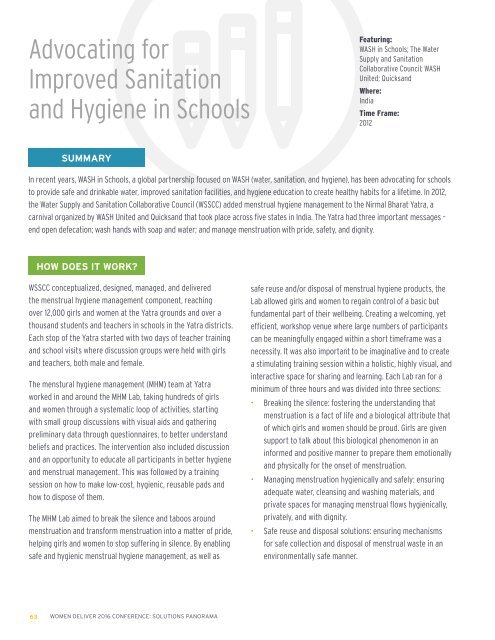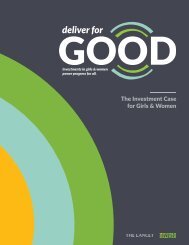Solutions Panorama
A collection of 100 programs, initiatives, and strategies that were shared at the Women Deliver 2016 Conference.
A collection of 100 programs, initiatives, and strategies that were shared at the Women Deliver 2016 Conference.
You also want an ePaper? Increase the reach of your titles
YUMPU automatically turns print PDFs into web optimized ePapers that Google loves.
Advocating for<br />
Improved Sanitation<br />
and Hygiene in Schools<br />
Featuring:<br />
WASH in Schools; The Water<br />
Supply and Sanitation<br />
Collaborative Council; WASH<br />
United; Quicksand<br />
Where:<br />
India<br />
Time Frame:<br />
2012<br />
SUMMARY<br />
In recent years, WASH in Schools, a global partnership focused on WASH (water, sanitation, and hygiene), has been advocating for schools<br />
to provide safe and drinkable water, improved sanitation facilities, and hygiene education to create healthy habits for a lifetime. In 2012,<br />
the Water Supply and Sanitation Collaborative Council (WSSCC) added menstrual hygiene management to the Nirmal Bharat Yatra, a<br />
carnival organized by WASH United and Quicksand that took place across five states in India. The Yatra had three important messages –<br />
end open defecation; wash hands with soap and water; and manage menstruation with pride, safety, and dignity.<br />
HOW DOES IT WORK?<br />
WSSCC conceptualized, designed, managed, and delivered<br />
the menstrual hygiene management component, reaching<br />
over 12,000 girls and women at the Yatra grounds and over a<br />
thousand students and teachers in schools in the Yatra districts.<br />
Each stop of the Yatra started with two days of teacher training<br />
and school visits where discussion groups were held with girls<br />
and teachers, both male and female.<br />
The menstural hygiene management (MHM) team at Yatra<br />
worked in and around the MHM Lab, taking hundreds of girls<br />
and women through a systematic loop of activities, starting<br />
with small group discussions with visual aids and gathering<br />
preliminary data through questionnaires, to better understand<br />
beliefs and practices. The intervention also included discussion<br />
and an opportunity to educate all participants in better hygiene<br />
and menstrual management. This was followed by a training<br />
session on how to make low-cost, hygienic, reusable pads and<br />
how to dispose of them.<br />
The MHM Lab aimed to break the silence and taboos around<br />
menstruation and transform menstruation into a matter of pride,<br />
helping girls and women to stop suffering in silence. By enabling<br />
safe and hygienic menstrual hygiene management, as well as<br />
safe reuse and/or disposal of menstrual hygiene products, the<br />
Lab allowed girls and women to regain control of a basic but<br />
fundamental part of their wellbeing. Creating a welcoming, yet<br />
efficient, workshop venue where large numbers of participants<br />
can be meaningfully engaged within a short timeframe was a<br />
necessity. It was also important to be imaginative and to create<br />
a stimulating training session within a holistic, highly visual, and<br />
interactive space for sharing and learning. Each Lab ran for a<br />
minimum of three hours and was divided into three sections:<br />
• Breaking the silence: fostering the understanding that<br />
menstruation is a fact of life and a biological attribute that<br />
of which girls and women should be proud. Girls are given<br />
support to talk about this biological phenomenon in an<br />
informed and positive manner to prepare them emotionally<br />
and physically for the onset of menstruation.<br />
• Managing menstruation hygienically and safely: ensuring<br />
adequate water, cleansing and washing materials, and<br />
private spaces for managing menstrual flows hygienically,<br />
privately, and with dignity.<br />
• Safe reuse and disposal solutions: ensuring mechanisms<br />
for safe collection and disposal of menstrual waste in an<br />
environmentally safe manner.<br />
63<br />
WOMEN DELIVER 2016 CONFERENCE: SOLUTIONS PANORAMA



